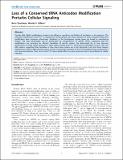| dc.contributor.author | Zinshteyn, Boris | |
| dc.contributor.author | Gilbert, Wendy | |
| dc.date.accessioned | 2013-09-30T17:44:15Z | |
| dc.date.available | 2013-09-30T17:44:15Z | |
| dc.date.issued | 2013-08 | |
| dc.date.submitted | 2013-04 | |
| dc.identifier.issn | 1553-7404 | |
| dc.identifier.issn | 1553-7390 | |
| dc.identifier.uri | http://hdl.handle.net/1721.1/81248 | |
| dc.description.abstract | Transfer RNA (tRNA) modifications enhance the efficiency, specificity and fidelity of translation in all organisms. The anticodon modification mcm[superscript 5]s[superscript 2]U[superscript 34] is required for normal growth and stress resistance in yeast; mutants lacking this modification have numerous phenotypes. Mutations in the homologous human genes are linked to neurological disease. The yeast phenotypes can be ameliorated by overexpression of specific tRNAs, suggesting that the modifications are necessary for efficient translation of specific codons. We determined the in vivo ribosome distributions at single codon resolution in yeast strains lacking mcm[superscript 5]s[superscript 2]U. We found accumulations at AAA, CAA, and GAA codons, suggesting that translation is slow when these codons are in the ribosomal A site, but these changes appeared too small to affect protein output. Instead, we observed activation of the GCN4-mediated stress response by a non-canonical pathway. Thus, loss of mcm[superscript 5]s[superscript 2]U causes global effects on gene expression due to perturbation of cellular signaling. | en_US |
| dc.description.sponsorship | National Institutes of Health (U.S.) (Grant GM081399) | en_US |
| dc.language.iso | en_US | |
| dc.publisher | Public Library of Science | en_US |
| dc.relation.isversionof | http://dx.doi.org/10.1371/journal.pgen.1003675 | en_US |
| dc.rights | Creative Commons Attribution | en_US |
| dc.rights.uri | http://creativecommons.org/licenses/by/2.5/ | en_US |
| dc.source | PLoS | en_US |
| dc.title | Loss of a Conserved tRNA Anticodon Modification Perturbs Cellular Signaling | en_US |
| dc.type | Article | en_US |
| dc.identifier.citation | Zinshteyn, Boris, and Wendy V. Gilbert. “Loss of a Conserved tRNA Anticodon Modification Perturbs Cellular Signaling.” Edited by Gregory P. Copenhaver. PLoS Genetics 9, no. 8 (August 1, 2013): e1003675. | en_US |
| dc.contributor.department | Massachusetts Institute of Technology. Department of Biology | en_US |
| dc.contributor.mitauthor | Zinshteyn, Boris | en_US |
| dc.contributor.mitauthor | Gilbert, Wendy | en_US |
| dc.relation.journal | PLoS Genetics | en_US |
| dc.eprint.version | Final published version | en_US |
| dc.type.uri | http://purl.org/eprint/type/JournalArticle | en_US |
| eprint.status | http://purl.org/eprint/status/PeerReviewed | en_US |
| dspace.orderedauthors | Zinshteyn, Boris; Gilbert, Wendy V. | en_US |
| dc.identifier.orcid | https://orcid.org/0000-0003-2807-9657 | |
| mit.license | PUBLISHER_CC | en_US |
| mit.metadata.status | Complete | |
